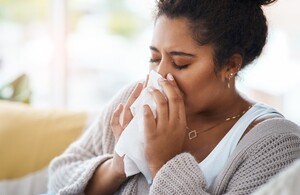UKHSA winter briefing
The UK Health Security Agency (UKHSA) sets out serious impacts of flu ahead of winter as eligible groups urged to come forward for vaccination.

The UK Health Security Agency (UKHSA) is urging vulnerable groups to take up the flu vaccine as data shows last year’s programme prevented around 25,000 hospitalisations in England.
Even with these hospitalisations averted, excess winter deaths from flu were higher than those from COVID-19 in the 2022 to 2023 season, with over 14,000 recorded. Over 10,000 children were admitted to hospital and total hospitalisations for flu eclipsed those for COVID-19 at the peak of the season.
Pregnant women, young children and those with certain chronic medical conditions, such as coronary heart disease, cerebral palsy, liver or spleen disorders or long-term lung conditions, are particularly vulnerable to flu.
Effectiveness data from last year showed the flu vaccine reduced the risk of hospitalisations by two-thirds in children. Recent UKHSA modelling (surveillance graphs for week 37) also shows last year’s flu programme prevented around 25,000 hospitalisations in England, with just under 50,000 hospitalisations recorded through the season.
Data from this year’s Southern Hemisphere winter season, where the H1N1 subtype was dominant, suggests the current flu vaccines are well matched against circulating strains, with the Australian government officially recording its season as ‘low’ clinical severity.
It is possible the seasonal H1N1 virus could return to the UK where it has had limited circulation since 2019, after which measures to control the COVID-19 pandemic virtually eliminated the spread of all flu until the 2022 to 2023 season, when other subtypes re-emerged.
All eligible groups are being encouraged to take up the flu vaccine, and at the same time book their COVID-19 autumn booster to protect themselves against the expected rise in cases as winter approaches.
Professor Susan Hopkins, Chief Medical Adviser at UKHSA, said:
Last year, the flu virus was estimated to be responsible for over 14,000 excess deaths and tens of thousands of hospitalisations, including over 10,000 in children.
Last winter the vaccine prevented an estimated 25,000 hospitalisations, but this could be even greater if all those eligible for the flu vaccine came forward this year. Pregnant women, young children and those with chronic health conditions are particularly vulnerable, and we have good evidence to suggest this year’s vaccine will offer good protection.
Taking up both the flu and COVID-19 vaccines ahead of winter provides the best level of protection against severe illness and will help ease the pressure on the NHS this winter.
Vaccines Minister Maria Caulfield said:
After beginning the NHS winter vaccination campaign early, this winter rollout will continue our tireless efforts to equip our communities with immunity against COVID-19 and flu and protect the most vulnerable among us.
Flu placed a greater burden on hospitals than COVID-19 last year, so it’s essential that we all take part in reducing pressure on the health system by booking our COVID-19 and flu jabs as soon as possible to keep ourselves and our loved ones safe from infection.
The NHS has already delivered flu jabs to over 2.8 million people since the start of the autumn campaign and given over 1 million autumn COVID-19 jabs since national bookings started on 18 September. Please do come forward and get your jabs to protect yourself and your loved ones.
Deputy Chief Medical Officer Dr Thomas Waite said:
Flu and COVID-19 circulated last winter, causing significant peaks and resulting in thousands of hospitalisations and deaths. It is important that we are protected against both.
Vaccination is our strongest form of defence so if you are eligible, please come forward and get your jabs as soon as possible.
In addition to flu, cases of COVID-19 are expected to rise this winter, increasing the risk to vulnerable groups.
All eligible adults are urged to book their flu and COVID-19 vaccines online via the NHS website, by downloading the NHS App, or by calling 119 for free if they can’t get online, to give themselves the best protection against severe illness and hospitalisation.
Parents of children aged 2 and 3 years (on 31 August) should book a nasal spray flu vaccine for their child at their local GP surgery.
The schools programme also began in early September, with those aged 4 years up to those aged 16 years (school year 11) being offered a nasal spray vaccine, or an injection if this is unsuitable.
It is important young people take up the vaccine as it protects the child themselves and helps stop the spread to vulnerable people around them, including babies, grandparents and people with weak immune systems.
Chief Delivery Officer and National Director for Vaccinations and Screening for NHS England, Steve Russell, said:
The NHS is off to a flying start with its COVID-19 and flu vaccination programme – with millions of people who are most at risk already receiving flu and COVID-19 vaccines since the start of the campaign, with hundreds of thousands more booked in to receive theirs this week.
The NHS is inviting everyone eligible for a flu and COVID-19 vaccine to book online, via the app or by calling 119, and NHS staff are once again pulling out all the stops to deliver lifesaving vaccinations, with more vaccine sites than ever before to ensure people receive vital protection ahead of the winter months.
Not only will these vaccines protect you and your loved ones from getting sick this winter, but they will also help ease pressure on the NHS by reducing hospitalisations – we want to see millions more getting vital protection – so please come forward and book your vaccines today.
UK Health Security Agency press office
10 South Colonnade
London
E14 4PU